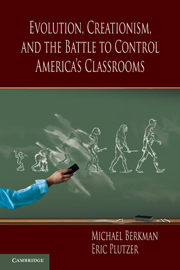Book contents
- Frontmatter
- Contents
- Figures
- Tables
- Acknowledgments
- Introduction
- 1 Who Should Decide What Children Are Taught?
- 2 The Public Speaks: “Teach Both”
- 3 A Nation Divided by Religion, Education, and Place
- 4 Is Evolution Fit for Polite Company? Science Standards in the American States
- 5 Teachers and What They Teach
- 6 State Standards Meet Street-Level Bureaucracy
- 7 When the Personal Becomes Pedagogical
- 8 Teachers in Their Schools and Communities
- 9 The Battle for America’s Classrooms
- Appendix to Chapter 2
- Appendix to Chapter 3
- Appendix to Chapter 4
- Appendix to Chapter 5
- Appendix to Chapter 6
- References
- Judicial Opinions and Court Cases Cited
- Index
3 - A Nation Divided by Religion, Education, and Place
Published online by Cambridge University Press: 05 June 2012
- Frontmatter
- Contents
- Figures
- Tables
- Acknowledgments
- Introduction
- 1 Who Should Decide What Children Are Taught?
- 2 The Public Speaks: “Teach Both”
- 3 A Nation Divided by Religion, Education, and Place
- 4 Is Evolution Fit for Polite Company? Science Standards in the American States
- 5 Teachers and What They Teach
- 6 State Standards Meet Street-Level Bureaucracy
- 7 When the Personal Becomes Pedagogical
- 8 Teachers in Their Schools and Communities
- 9 The Battle for America’s Classrooms
- Appendix to Chapter 2
- Appendix to Chapter 3
- Appendix to Chapter 4
- Appendix to Chapter 5
- Appendix to Chapter 6
- References
- Judicial Opinions and Court Cases Cited
- Index
Summary
Question: Why do so many people believe in the theory of evolution?
Answer: Some people believe in evolution because that's all they know. In school, at home, on T.V. – everywhere they look – that is all they hear. They don't know there are problems with the theory, or that there are good reasons for believing that God created everything. Other people believe in evolution because they have studied science and believe the evidence supports the theory. Often, these people have not considered the wonderful evidence for creation. Sadly, some people believe in evolution because they think it supports their denial of God's existence.
Digger Doug, Discovery Magazine (Scripture and Science for Kids)Question: So many people resist believing in evolution. Where does the resistance come from?
Answer: It comes, I'm sorry to say, from religion. And from bad religion. You won't find any opposition to the idea of evolution among sophisticated, educated theologians. It comes from an exceedingly retarded, primitive version of religion, which unfortunately is at present undergoing an epidemic in the United States. Not in Europe, not in Britain, but in the United States.
Richard Dawkins (2005)Darwin published On the Origin of Species (or simply, The Origin) in 1859 and The Descent of Man in 1871. By the late 1920s, anti-evolutionism in the United States was a complex and well-developed social movement (Lienesch 2007), and the controversy over teaching evolution was highly divisive (Ginger 1958; Larson 1989; Numbers 1992). The most important lines of division concerned religion, education, and geography. The popular view, reinforced by the images of the Scopes trial in the public imagination, is that opposition to evolution was a distinctive product of southern, poorly educated fundamentalists.
Of course, the social divisions underlying the evolution conflict were not so clear cut then. In the 1920s, there were differences within Protestantism (Marsden 1982); fundamentalism was not the only Christian tradition opposed to evolution (Ruse 2005); the leaders of the anti-evolution movement were themselves well educated and drawn from the middle class (Numbers 1992); and, although the movement only achieved legislative success in the South, it had considerable popular support throughout the nation (Larson 1989; Lienesch 2007). What we can say as a generalization is that anti-evolutionism was most prominent among those caught up in the nascent fundamentalist movement and in the non-metropolitan areas of the South and the Midwest (Larson 1989; see also Woodberry and Smith 1998 on the migration of southern conservative Protestants to other parts of the country).
- Type
- Chapter
- Information
- Publisher: Cambridge University PressPrint publication year: 2010



